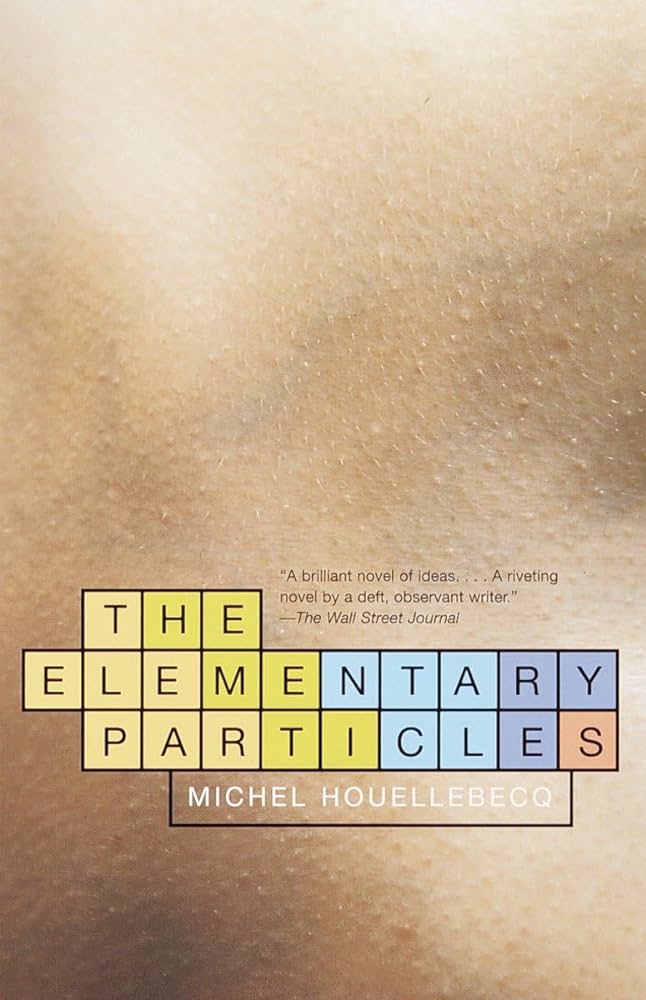
translated by Frank Wynne
original publication (in French): 1998
first English edition: 2000
grab a copy here or through your local independent bookstore or library
“This book is dedicated to mankind.” Thus ends Michel Houellebecq’s strange novel The Elementary Particles, a story about, among other things, half-brothers, France, molecular biology, sex, and morality. Translated beautifully from the French by Frank Wynne and spanning a century, the book focuses mostly on the sad, lonely lives of Michel and Bruno Djerzinski as they each pursue their passion—in Michel’s case, it’s understanding mutations and sexual reproduction; while for Bruno, it’s satisfying his seemingly unlimited sexual desire. While neither one is able to have a long-term, stable romantic relationship, they do eventually find women who accept them as they are, though that happens when all are much older.
Michel, the younger half-brother, finds that he is unable to experience romantic love, despite being close for many years with a girl who lives in his village. Annabelle waits for Michel to express affection, but when he doesn’t, they drift apart, with Michel embarking on a career in molecular biology. His success in academia is paired with a lonely existence, in which he doesn’t feel much of anything, except lingering affection for the grandmother who raised him. As a biographer writes of him many years after Michel’s disappearance/death, “one of the marks of Djerzinki’s genius… was his ability to go beyond his first intuition that sexual reproduction was, in itself, a source of deleterious mutations…[he] understood it was necessary to look past the framework of sexual reproduction to study the general topological conditions of cell division” (136).
This scientific, detached study of sex is reflected in Bruno’s experiences with women, in which sex is described in a monotonous narrative voice and body parts in great detail. The narrator connects what we see as an almost desperate promiscuity with the general dissolution of morality in Western society starting in the 1970s. Sex has become reduced to an exchange and empty pleasure, with relationships breaking down in the absence of real human connection. It is Michel, ironically, who is able to “solve” this problem when he flees France for Ireland and engages in in-depth research into sexual reproduction. Michel figures out that “any genetic code, however complex, could be noted in a standard, structurally stable form, isolated from disturbances or mutations.” Thus, “every animal species, however highly evolved, could be transformed into a similar species reproduced by cloning, and immortal.”
This is what the narrator calls a “metaphysical mutation”–one of the few that has happened so far in human history. And yet, as the ending of the book explains, human history has nearly ended already (in the 2070s). The narrator is a member of this new species, which doesn’t experience the pain or pleasure that humanity did, but that lives in what humans think is a “paradise” (the narrator doesn’t comment on this). Humans are dying out, having replaced themselves via science and technology. Genetic differences have been erased, everyone lives together peacefully—it makes one think about Huxley’s Brave New World, which the brothers discuss in the middle of the book. As Bruno says, people claim that Huxley’s book is a dystopian nightmare but, according to Bruno, it’s actually what everyone is striving toward. The ending of the book, where the reader realizes that the narrator isn’t, in fact, human, is unsettling. For this reader, fewer pages given to Bruno’s sexual experiences and more given to Michel’s breakthrough would have made the book more interesting and less uneven.
